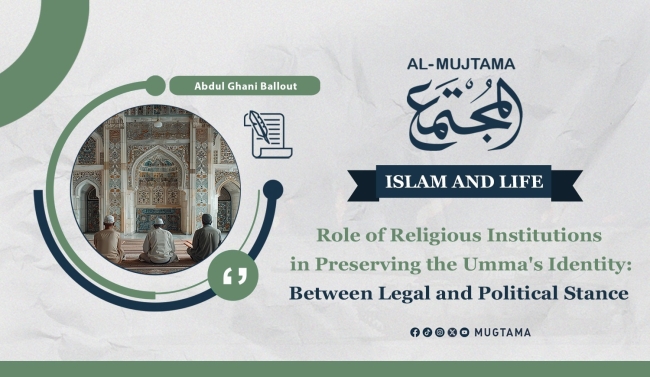Role of Religious Institutions in Preserving the Umma's Identity: Between Legal and Political Stance
Nations and societies strive to preserve their civilizational, cultural, and social identity, relying on their strengths to advance their countries, ensure the prosperity of their people, and raise their flag among the nations of the world.
Islamic societies possess sufficient intrinsic and extrinsic components to maintain this identity, enhance their sense of belonging to the Islamic Ummah, defend its sanctities, and connect contemporary issues with their faith.
In addition to various civic efforts, official religious institutions play the largest role in all of this, with their substantial material resources and influential authority within the state and society.
However, the question remains: To what extent can these institutions contribute to preserving the nation's identity without aligning too closely with political stances?
A Greater Role
Dr. Rashid Al-Hamdawi, a researcher in Islamic sciences, told "Al-Mujtama": The features of the umma’s civilizational, cultural, and social identity are determined through the Quran and the practical application of its teachings through the Sunnah of the Prophet and the lives of the Companions and Followers.
Dr. Al-Hamdawi: Preserving and Protecting the Identity Depends on Various Means, Foremost of Which Are Religious Institutions
Moroccan academic Dr. Rashid Al-Hamdawi highlights that preserving and protecting the umma's identity from distortion relies on various means, foremost among them being religious institutions. In our time, protecting the identity of the country has become the primary goal of official religious institutions. Ministries of Islamic Affairs in each country can develop strategies to counter destructive ideas, deviant behaviors, and foreign customs from other cultures. They can utilize religious institutions under their umbrella, particularly mosques. Since the time of the Prophet, the mosque has been the institution with the greatest impact on preserving the identity of Muslims through powerful Friday sermons, eloquent admonitions, beneficial scholarly lessons, and the heartfelt recitation of the Quran that leaves a deep impression on the hearts of worshippers.
He adds: However, this cannot be achieved unless those in charge of these institutions are aware of their responsibility to preserve the identity of the entire umma, recognizing the dangers that threaten it, and working diligently and sincerely to prevent what may corrupt it.
Capabilities
In turn, Mauritanian researcher and writer Ikhlehen Arrajoul Muhammad Al-Amin tells "Al-Mujtama": Official religious institutions can play many roles and tasks in protecting identity and promoting religiosity within society and the state. This is because they possess official budgets within government budgets that enable them to do so.
He points out their significant roles in preserving the Islamic identity of the state, through issuing fatwas, conducting religious programs, guiding people, caring for mosques and religious institutes, and supervising religious seasons (holidays, Hajj, etc.).
Al-Amin: If Religious Institutions Were Freed from Political Subordination, They Could Achieve Significant Advances in Building Religious Awareness
Despite the commendable efforts of these institutions, what is expected of them is much greater.
Researcher Muhammad Al-Amin highlights that the problem with these institutions lies in two fundamental issues. Firstly, in some countries, they do not have a vision for enhancing and protecting identity; rather, they operate based on the opinions and individual judgments of those who govern them. These opinions are not guided by a clear vision, nor are they directed by major goals and objectives.
Secondly, in all Maghreb countries, these institutions are subordinate to political regimes and are directed by them. They lack the strength and courage needed to cross the red lines set by politicians.
He concludes: If religious institutions were freed from political subordination, meaning that the legal stance is not dictated by the political stance, and if they possessed a clear vision for the religious field that identifies deficiencies and sets goals and objectives, they could achieve significant advances in building religious awareness and enhancing the Islamic identity within the Maghreb countries.
-------------------------------------------------------------







